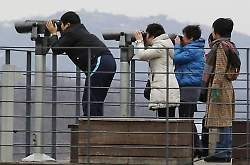Despite war threats, South Korea’s tourism up 11.9 percent

SEOUL, Republic of Korea – “So, how can we promote Seoul as a safe destination in the foreign media in the midst of the current North Korea situation?”
That was the question posed by a Seoul government foreign public relations representative at a meeting on Monday, even as Pyongyang continued its militaristic rhetoric, announcing on the same day that North Korea is pulling workers out of a joint North-South industrial zone.
Fearing both short and long term drops in tourism, the Seoul government was seeking advice at a meeting it requested with North Korea expert Andrei Lankov, a professor at Seoul’s Kookmin University.
“It’s a very important question, but the problem is that the foreign media believes North Korea’s threats when they should not,” said Lankov, who has been studying North Korea for almost 30 years.
Throughout the meeting, which took place in Lankov’s office, the professor ignored his mobile phone and office land line, even as both rang incessantly.
“Journalists,” he said, shaking his head.
Lankov advised the Seoul government to bombard the media with images showing how the day to day lives of South Koreans have remained unaffected by North Korean threats, and how its residents remain unconcerned by the hostile rhetoric.
“Negative impact on South Korean tourism and the South Korean economy is exactly what North Korea wants,” said Lankov, who is adamant in his belief that North Korea won’t attack the South.
“[North Korean leader] Kim Jong Un is living a wonderful life that is better than any conglomerate owner’s life in South Korea — why would he want to cut that short?” said the North Korea expert.
“He is therefore the one person South Korea can truly depend on to not go to war,” Lankov concluded.
It seems logical that tourism in Seoul, and all of South Korea, would suffer in the wake of the hostile rhetoric from the North Korean government. Seoul is located just 190 kilometers (118 miles) from Pyongyang, well within range of hundreds if not thousands of North Korean artillery and missile units.
However, no country has yet issued alerts or warnings concerning travel to South Korea.
“The Embassy has not changed its security posture and we have not recommended that U.S. citizens who reside in, or plan to visit, the Republic of Korea (South Korea) take special security precautions at this time,” reads a statement posted on the U.S. Embassy in Seoul’s website.
There’s no denying, however, that some travelers are altering their plans.
“We had two colleagues in New York who decided to push back their business trip to Seoul because of the North Korea crisis,” said Annie Kim, a Korean American risk manager at a multinational bank.
Kim, who arrived in Seoul two weeks ago on business, said she doesn’t believe the threats pose a danger.
Her colleagues, however, are getting more nervous about the situation with each news report.
“They say they will come only after it all blows over,” she said.
Despite concerns, tourism numbers in South Korea are up. Way up.
Last week, the Korea Tourism Organization (KTO) announced a record number of visitors for the month of March.
For the first time in history, inbound international tourists numbered more than a million — an 11.9% increase compared with the same month last year. Numbers for April won’t be available until May.
“We’ve had record numbers from every country except Japan and Germany,” KTO’s Kang Sun-duk told CNN.
According to Kang, tourist numbers are impacted by geopolitics, but not necessarily those involving North Korea.
“Many of the Chinese tourists who would have been visiting Japan are now coming to South Korea due to the island disputes between China and Japan,” said Kang.
Approximately 12,000 visitors per day are currently entering South Korea on cruises from China, according to the KTO.
South Korea’s largest airline, Korean Air, and several major hotels in Seoul, tell CNN there has been no noticeable dip in bookings.
“We have not seen any impact from the news from North Korea thus far, but we’ll have to see about any further impact,” a Korean Air public relations representative said.
This past weekend at Imjingak, an area within the Demilitarized Zone (DMZ) popular with tourists, business appeared down only slightly.
Though parking lots were jammed with Chinese tour groups and Korean families on day trips, the DMZ appeared to have fewer Western visitors than usual.
“We’ve seen around a 20% decrease in business, but it’s not too bad,” said Kim Bong-nam, 57, who has been selling hot dogs at the DMZ for 30 years.
“There was a similar drop in visitors when the Yeonpyong Island shelling happened,” he said, referring to the 2010 incident when two civilians and two South Korean marines died after a North Korean attack.
KTO’s DMZ office said tours were operating normally. The KTO was unable to provide specific DMZ visitor data.
“We are not afraid at all!” said a member of a group of tourists from Hebei, China, when asked why they’d decided to visit the DMZ in the midst of current reports. “There will be only peace here.”
According to Professor Lankov, there’s a reason Chinese tourists are unruffled by the threats from North Korea.
According to the North Korea expert, Chinese media isn’t reporting on the situation in dire tones. He said Chinese reporters haven’t adopted the posture of their Western counterparts, “like CNN and BBC, as if war is going to break out.”
“The Chinese government doesn’t allow them to portray their fellow communist country in that light,” said Lankov. Source: CNN ( April 8,2013)















